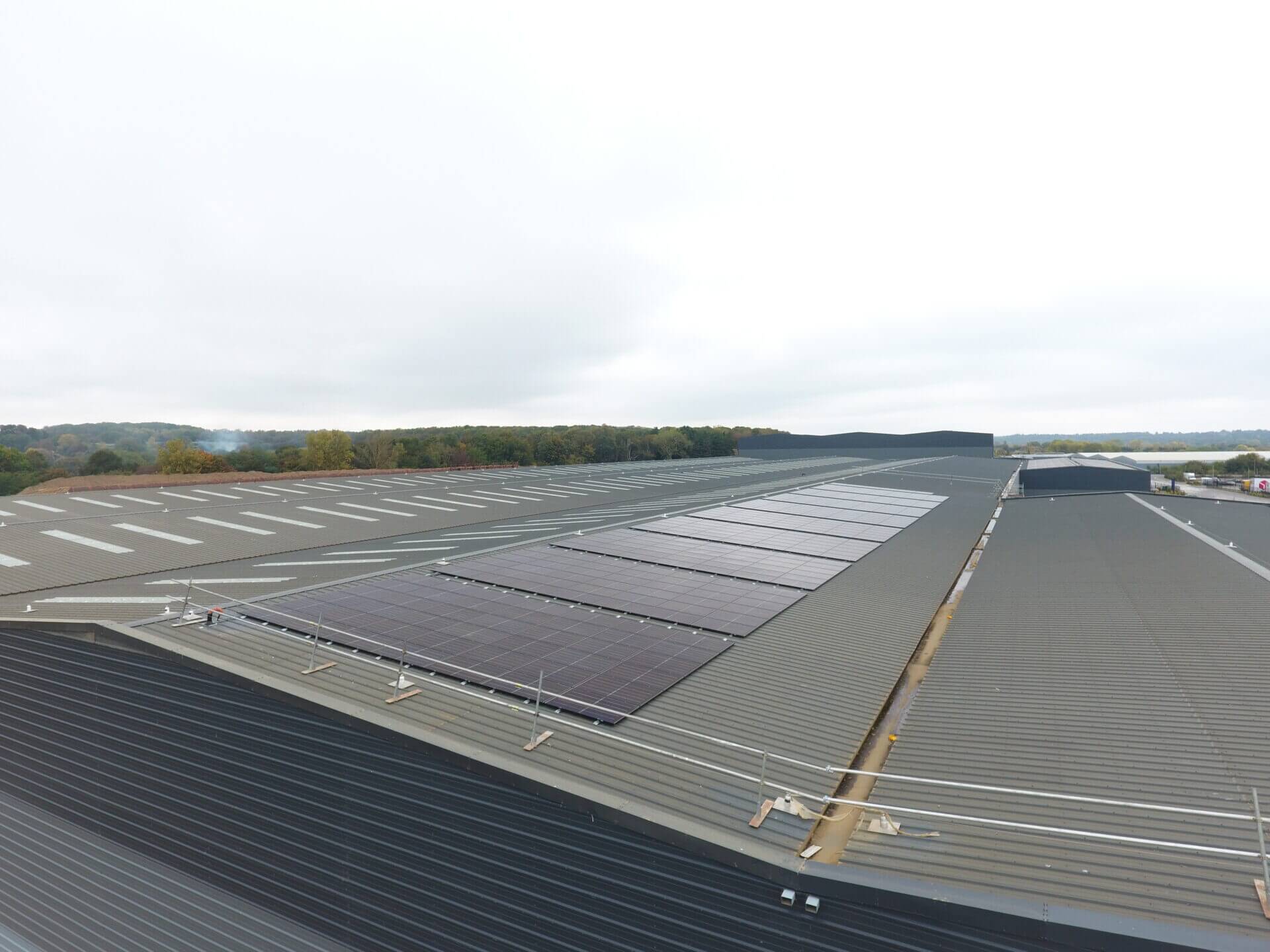Solar energy is more than just a trend, it’s a revolutionary way to power homes and businesses sustainably. However, to make the most of this renewable resource, you need the right battery storage solutions.
This article discusses the important role of batteries in solar panel systems. This article talks about how batteries are important in solar panel systems. It provides key information on selecting, installing, and maintaining the right battery storage for your solar power needs. If you own a home or a business, knowing about solar batteries can help you make your solar power system work better.
Introduction to Solar Batteries
Solar batteries play a pivotal role in any solar panel system. Solar batteries store energy from your panels for use when the sun is not shining. This makes sure you have a constant flow of electricity and improves how well your solar power system works.
The primary function of a solar battery is to manage the energy flow within your solar panel system. These batteries store extra energy from the day to make sure you have enough power at night or when it’s cloudy. This capability makes solar batteries indispensable for both residential and commercial solar setups.
Utilising solar batteries can also reduce your dependency on the grid, potentially lowering your electricity bills. Additionally, having a reliable storage system can serve as a backup during power outages, offering peace of mind and uninterrupted power supply.

Types of Solar Batteries
When it comes to solar batteries, there are several types to choose from, each with its own set of advantages and disadvantages. Understanding these options is crucial in making an informed decision.
Lead-Acid Batteries
Lead-acid batteries are one of the oldest and most reliable types of solar batteries. They are generally cheaper than other types and are widely available. However, they have a shorter lifespan and lower energy density compared to newer technologies.
Lithium-Ion Batteries
Lithium-ion batteries have become increasingly popular due to their high efficiency and longer lifespan. They are more expensive upfront but offer better performance and require less maintenance. These batteries are ideal for both residential and commercial applications.
Flow Batteries
Flow batteries are an emerging technology that offers the advantage of scalability. They can store large amounts of energy and have a long lifespan. However, they are generally more expensive and less common than other types of batteries.
Understanding the different types of solar batteries is the first step in selecting the right one for your needs. Each type has its own set of characteristics, so it’s essential to consider your specific requirements and budget.
Key Considerations When Choosing a Solar Battery
Choosing the right solar battery involves more than just looking at the price. Several factors can influence your decision, including capacity, efficiency, lifespan, and compatibility with your existing solar panel system.
Capacity
Capacity measures how much energy a battery can store, usually expressed in kilowatt-hours (kWh). Larger capacities can store more energy, which is beneficial for households or businesses with high energy consumption.
Efficiency
Efficiency refers to how well a battery can convert stored energy back into usable electricity. Higher efficiency means less energy loss, making the system more cost-effective in the long run.
Lifespan
The lifespan of a battery is generally given in cycles, which refers to the number of complete charge and discharge cycles a battery can undergo before its capacity significantly degrades. A longer lifespan means better value over time. Considering these factors will help you make an informed decision, ensuring that your solar battery meets your energy needs and offers good value for money
Battery Sizing and System Design
Correctly sizing your solar battery is crucial for optimal performance. An undersized battery won’t store enough energy, while an oversized one can be a waste of resources.
Calculating Your Energy Needs
The first step in battery sizing is to calculate your daily energy consumption. This can be done by reviewing your electricity bills and noting the average kilowatt-hours used per day.
System Design
System design involves determining the number of solar panels and batteries required to meet your energy needs. This includes taking into account factors like peak sunlight hours and panel efficiency.
Integration
Proper integration of the battery with your existing solar panel system is essential for seamless operation. This may involve additional components like inverters and charge controllers. Proper sizing and smart system design can help you get the most out of your investment. Dependable energy storage and effective power management achieve this.
Installation and Integration
Installing a solar battery system is a complex task that requires professional expertise. Incorrect installation can lead to inefficiency and even safety hazards.
Professional Installation
Hiring a certified installer ensures that your battery system is set up correctly. Professionals can also provide valuable advice on the best placement and configuration for your specific setup.
Integration with Existing Systems
Integrating a new battery with an existing solar panel system can be challenging. Proper wiring and configuration are essential for seamless operation and optimal performance.
Safety Considerations
Safety is paramount when dealing with electrical systems. Ensure that all components are installed according to safety standards to prevent any risks. Getting your solar battery system installed and integrated correctly by a professional is important for its efficiency and safety.
Maintenance and Lifespan of Solar Batteries
Maintaining your solar battery is essential for extending its lifespan and ensuring optimal performance. Different types of batteries have varying maintenance requirements.
Regular Inspections
Regular inspections can help identify potential issues before they become significant problems. Check for signs of wear, corrosion, and any abnormalities in performance.
Cleaning
Keeping your battery clean can also improve its efficiency. Dust and debris can affect the performance of solar panels and, by extension, the battery.
Monitoring
Many modern solar battery systems come with monitoring options, allowing you to track performance in real-time. This can help you make informed decisions about maintenance and usage. Taking care of your solar battery is important to make it last longer and work better, so you get the most from your money.

Cost and Financial Considerations
Although a solar battery may be expensive at first, it is important to think about the money you can save in the long run. These include savings on electricity bills and potential incentives.
Initial Investment
The initial cost of a solar battery includes the price of the battery itself, installation fees, and any additional components required for integration.
Long-Term Savings
Over time, the savings on electricity bills can offset the initial investment. Additionally, many regions offer incentives and rebates for installing solar battery systems.
Return on Investment (ROI)
Calculating the ROI involves comparing the upfront costs with the long-term savings. This can help you determine the financial viability of your solar battery system. Considering both the initial investment and long-term financial benefits can help you make an informed decision, ensuring that your solar battery system offers good value for money.
Future Trends in Solar Battery Technology
The field of solar battery technology is continually evolving, with new advancements promising even better performance and efficiency.
Solid-State Batteries
Solid-state batteries are an emerging technology that offers higher energy density and longer lifespan compared to traditional batteries. They are still in the developmental stage but hold great promise.
Enhanced Recycling
Improved recycling methods are being developed to make solar batteries more environmentally friendly. This reduces waste and makes the technology more sustainable.
Integration with Smart Grids
Future solar battery systems are expected to integrate seamlessly with smart grids, allowing for better energy management and distribution. Watching for future trends can help you stay ahead, making sure your solar battery system stays modern and effective.
Environmental Impact of Solar Batteries
While solar batteries offer numerous benefits, it’s essential to consider their environmental impact.
Resource Extraction
The extraction of materials used in batteries, such as lithium and cobalt, can have environmental consequences. Sustainable sourcing and recycling can help mitigate these impacts.
Recycling and Disposal
Proper recycling and disposal of solar batteries are crucial for minimising environmental harm. Many manufacturers are developing more efficient recycling methods.
Environmental Benefits
Despite some environmental concerns, solar batteries offer significant environmental benefits, such as reducing greenhouse gas emissions and promoting renewable energy. Considering the environmental impact of solar batteries can help you make more sustainable choices, contributing to a greener future.
Conclusion
Solar batteries are a crucial component of any solar panel system, offering numerous benefits in terms of efficiency, reliability, and sustainability. By understanding the different types of batteries, key considerations for selection, and best practices for installation and maintenance, you can optimise your solar power system for maximum performance.

